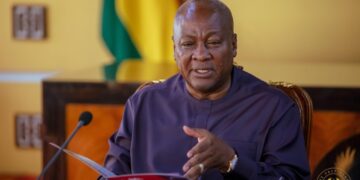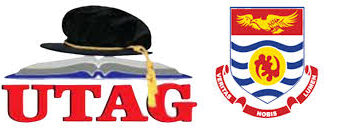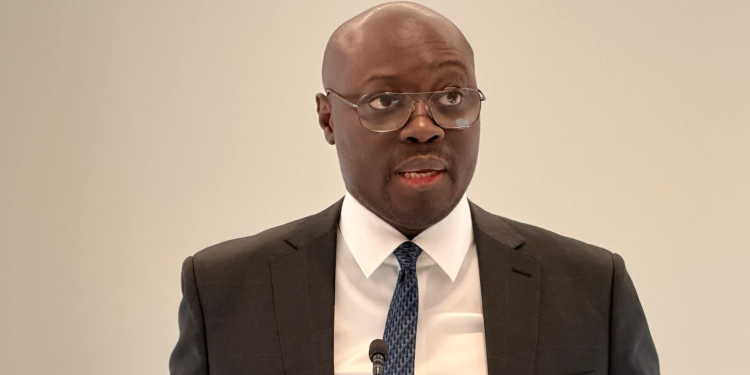The Minister of Finance, Dr. Cassiel Ato Baah Forson, has called on citizens and businesses to stop pricing goods and services in U.S. dollars, emphasizing that the Ghana cedi remains the only legal tender and a vital symbol of national sovereignty and pride.
Speaking at the official launch of the Cedi@60 celebration in Accra, Dr. Forson warned that the persistent use of foreign currencies in local transactions undermines the strength of the cedi and weakens confidence in Ghana’s economy.
‘The U.S. Dollar Is Not Our Currency’
Dr. Forson’s message was direct and impassioned as he reminded Ghanaians that pricing in dollars violates both national law and the spirit of economic independence.
“The Ghana cedi remains the only legal tender of our sovereign republic. The U.S. dollar is not our currency,” he declared.
“The continuous pricing of goods and services in U.S. dollars will only hurt us. Let’s stop it, and let’s stop it now.”
He cautioned that widespread dollarization — particularly in the real estate, hospitality, and import sectors — not only fuels inflation but also erodes public trust in the national currency.
Read Also: CSA issues urgent warning over GAF recruitment fraud on social media
Cedi at 60: A Symbol of Resilience and Independence
As Ghana marks six decades of the cedi, Dr. Forson underscored the currency’s historic role as more than just a medium of exchange. According to him, the cedi embodies Ghana’s economic resilience, sovereignty, and national identity.
“As we celebrate 60 years of the cedi, let us speak of it with pride — not as a burden but as a badge of our economic independence,” he urged.
The Finance Minister noted that the cedi has weathered global financial pressures, regional shocks, and internal economic challenges — yet continues to endure as a “pillar of Ghana’s fiscal sovereignty.”
Government’s Commitment to a Stable Currency
Dr. Forson assured citizens that the government remains committed to maintaining a strong and stable cedi through disciplined fiscal management, reduced deficits, and improved foreign exchange controls.
He highlighted that recent gains made by the cedi against major currencies were not accidental, but the result of deliberate and prudent economic measures implemented over the past year.
“The stability we are witnessing today is proof that when we act responsibly, our currency rewards us with resilience,” he said.
He also emphasized the role of the Bank of Ghana and other financial institutions in sustaining this progress through policies aimed at ensuring exchange rate stability and price moderation.
A Shared Responsibility to Protect the Cedi
Dr. Forson appealed to all Ghanaians to see the cedi not just as a transactional tool but as a collective responsibility. He urged citizens, entrepreneurs, and multinational firms operating in Ghana to “become vanguards” in protecting the currency’s value and dignity.
“Every citizen has a role to play. The choices we make daily — how we price, how we trade, how we speak of the cedi — all shape its strength,” he said.
He further encouraged financial institutions and businesses to adopt transparent pricing models that reflect the true spirit of Ghana’s economic independence.
Cedi@60 Celebration: Reflecting on the Journey
The Cedi@60 initiative, launched under the theme “Sustaining Confidence, Celebrating Heritage”, seeks to rekindle national pride in the currency and promote policies that safeguard its long-term value.
The event brought together policymakers, economists, bankers, and members of the private sector to reflect on six decades of monetary evolution — from the early days of the Ghana pound to today’s modern cedi.
According to the Ministry of Finance, the celebration will include nationwide public education campaigns, financial literacy programmes, and a “Proudly Priced in Cedi” business recognition initiative to reward companies that adhere to the national currency policy.
A Renewed Call for Economic Patriotism
Dr. Forson concluded his remarks with a rallying call for economic patriotism, urging Ghanaians to think beyond convenience and recognize the broader implications of dollar pricing.
“To price in dollars is to place another nation’s symbol above our own. The cedi is not just money — it is our story, our struggle, and our sovereignty,” he said.
He encouraged all sectors to renew their commitment to economic discipline, assuring that with collective effort, the cedi would remain a strong emblem of Ghana’s independence for generations to come.
Quick Facts: The Cedi at 60
- Introduced in 1965, replacing the Ghana pound.
- Officially recognized as the sole legal tender under the Bank of Ghana Act.
- Has undergone three major redenominations, the latest in 2007.
- Symbol: ₵, Code: GHS.


























